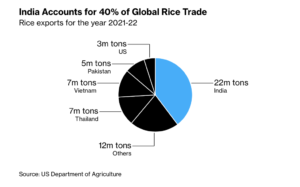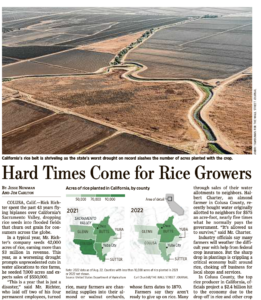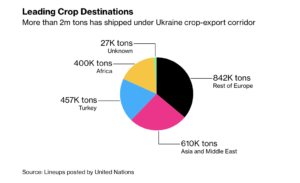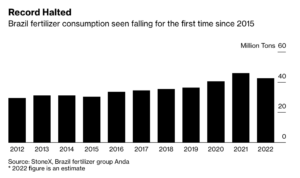President Donald Trump on Friday signed an executive order temporarily expanding the amount of beef the U.S. can import from Argentina, a move the White House says is aimed at…
India Restricts Rice Exports- Stoking Food Inflation Fears, as France, Romania Help Increase Ukrainian Grain Exports
Financial Times writers John Reed and Jyotsna Singh reported late last week that, “India imposed controls on exports of several varieties of rice on Friday, in a move likely to affect the global market for one of the most commonly eaten staple foods as commodity prices surge following Russia’s invasion of Ukraine.
“The country — the world’s leading exporter of rice, accounting for about 40 per cent of the global trade — imposed a 20 per cent duty on unmilled white rice, husked brown rice and semi-milled or wholly-milled rice. The restrictions do not apply to basmati rice, India’s best-known variety of the grain.”
Also last week, Bloomberg writers Pratik Parija and Swansy Afonso reported that, “India, the world’s biggest rice shipper, restricted exports of key varieties that mainly go toward feeding Asia and Africa, threatening to rattle global crop markets and exacerbate food inflation and hunger.
“The government has imposed a 20% duty on shipments of white and brown rice, and banned broken rice sales abroad. The curbs apply to roughly 60% of India’s overall rice exports, according to Bloomberg calculations.”

Wall Street Journal writer Vibhuti Agarwal reported on Friday that,
India banned exports of broken rice and levied a tax on other key varieties in a move that would add to global inflationary pressure and exacerbate food supply pains caused by the war in Ukraine.
And Bloomberg writers Patpicha Tanakasempipat, Pratik Parija, and Mai Ngoc Chau reported last week that, “The restrictions are threatening to ignite inflation for yet another key commodity, and may deprive some of the globe’s poorest nations of a crucial element of their diet.”
With respect to U.S. rice production, Jesse Newman and Jim Carlton reported in today’s Wall Street Journal that, “‘Even in a drought, rice farmers have been able to get a fairly high percentage of the water they had rights to,’ said Tim Johnson, chief executive of the California Rice Commission. ‘Now they are experiencing drought at a level they’ve never seen before.’
“California farmers sowed 285,000 acres of rice this spring, a 30% drop from the year prior and the lowest since the 1950s, according to a June estimate by the U.S. Department of Agriculture.”

In more specific developments impacting Ukraine, Reuters writer John Irish reported this week that, “France’s transport minister said on Sunday he would sign an agreement with Romania to help increase Ukrainian grain exports to developing countries including to the Mediterranean.”
“Romania, the EU’s second-largest exporter of wheat to non-EU countries, including Egypt, after France and the largest in maize (corn), has been one of the alternative routes used to export Ukrainian grain,” the Reuters article said.
The article noted that, “Ukraine has said it aims to use road, river and rail connections to increase its monthly grain exports.”
Meanwhile, Bloomberg writers Megan Durisin and Aine Quinn reported last week that, “Vladimir Putin’s barb that developing nations aren’t benefiting from the safe-corridor deal for Ukrainian grain isn’t backed up by the numbers.”
The Bloomberg article indicated that, “Lineups tracking Ukraine shipments show about 400,000 tons was shipped to Africa, with more than 600,000 tons going to Asia and the Middle East.

“Egypt was the third ranked individual country, while recent cargoes have also been dispatched to Somalia, Kenya and Sudan. Moreover, some of the grain arriving in Turkey, the world’s top flour shipper, may be milled and re-exported, according to the United Nations.”
Reuters writer Pavel Polityuk reported last week that, “About 280,000 tonnes of agricultural products will be exported in the near future from Ukrainian ports for the World Food Programme (WFP) under a UN-brokered deal, the Ukrainian infrastructure ministry said late on Wednesday.”
Also last week, Reuters writers Andrea Shalal and Jeff Mason reported last week that, “The United States sees no indication that a U.N.-brokered Ukrainian grain export deal is unraveling, the White House said on Thursday, after President Vladimir Putin triggered fears that Russia could withdraw support.”
Regarding Ukrainian production, Pavel Polityuk reported at Reuters late last week that, “Ukrainian farms have harvested 25.9 million tonnes of grain from 60% of the sown area in 2022 as of Sept. 9, the agriculture ministry said on Friday.”
And a separate Reuters article last week noted that, “Ukraine’s grain exports are down 48.6% year-on-year in the 2022/23 season so far at 5.291 million tonnes, the agriculture ministry said on Friday.”
In other news, Bloomberg writers Tatiana Freitas and Tarso Veloso Ribeiro reported last week that, “Fertilizer demand in top importer Brazil is expected to fall for the first time in eight years, boosting weather risk for corn and the world’s biggest soy harvest.

“Brazilian farmers will probably consume 7.2% less fertilizers in 2022 due to higher costs, according to an estimate from StoneX.”





